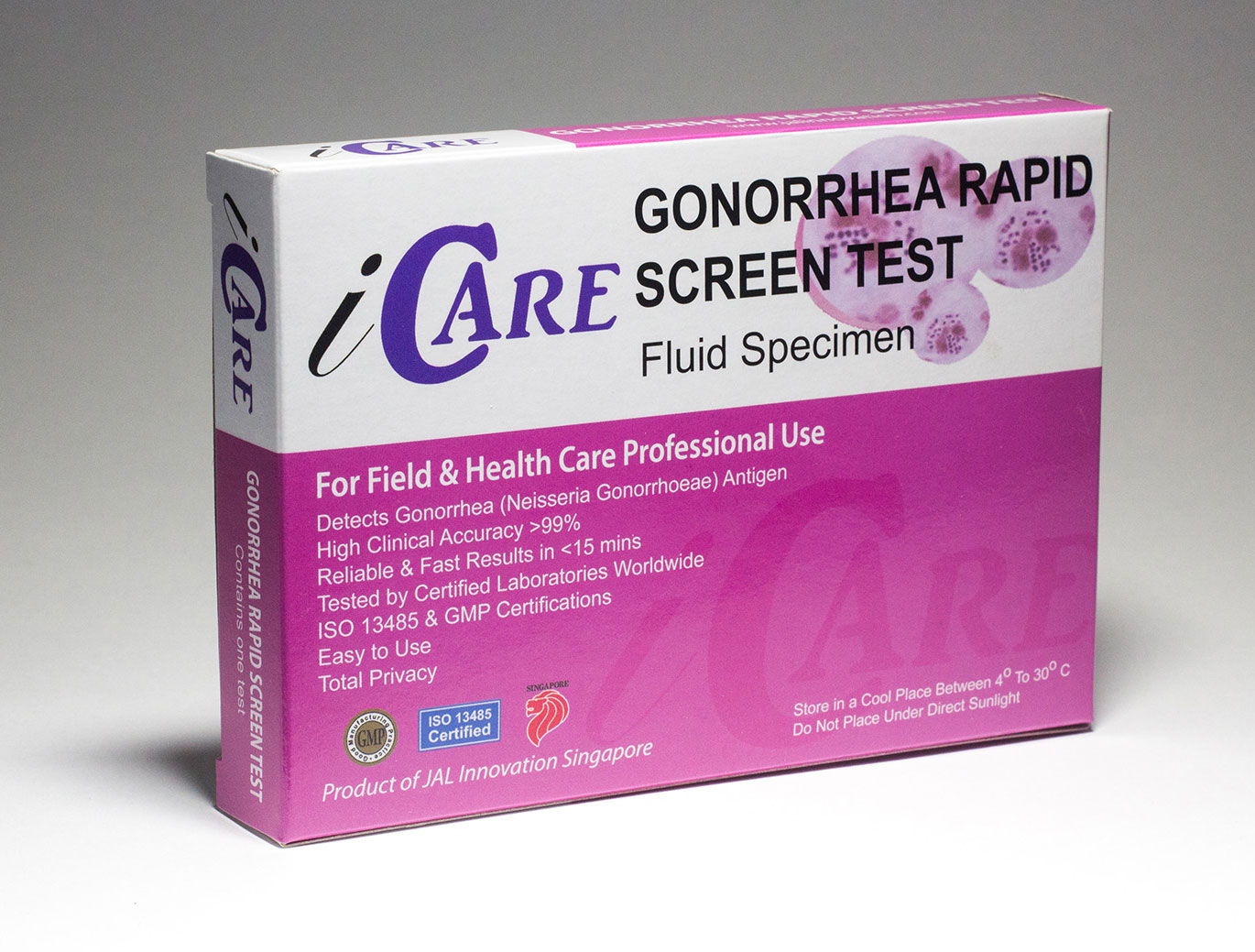Table of Contents
Gonorrhea remains a significant public health issue worldwide and Cambodia is no exception. The rural regions of Cambodia, such as Battambang, Kampong Cham, Kampong Thom, Takeo and Svay Rieng, face unique challenges in managing and preventing the spread of this sexually transmitted infection (STI). The lack of adequate healthcare infrastructure, combined with cultural barriers, makes it difficult to effectively diagnose and treat gonorrhea in these areas.
Access to gonorrhea rapid test kits offers a potential solution to these challenges. In rural cities like Battambang, where healthcare facilities are sparse, rapid testing can provide an affordable, easy and private method for individuals to check for gonorrhea. However, the success of this initiative depends largely on the awareness of local communities and the education provided about these testing options.
This article explores the role of gonorrhea home test kits in improving sexual health awareness and testing in rural Cambodia. We’ll discuss how gonorrhea diagnostics can benefit communities in Battambang, Kampong Cham and other rural regions and how community outreach can make a significant difference in these underserved areas.
The Importance of Gonorrhea Testing in Rural Cambodia
Why Gonorrhea Testing Matters in Rural Cambodia?

In rural areas like Kampong Thom and Svay Rieng, many people are unaware of the risks associated with gonorrhea. The symptoms of gonorrhea may be mild or non-existent and without regular testing, individuals may unknowingly pass the infection to others. Untreated gonorrhea can lead to serious complications, including infertility, pelvic inflammatory disease (PID) and increased vulnerability to HIV.
In areas like Takeo, where access to healthcare facilities can be difficult, people may go undiagnosed for long periods, allowing gonorrhea to spread unchecked. Increasing awareness about the importance of testing and providing access to gonorrhea rapid test kits could drastically reduce transmission rates in these communities.
Barriers to Gonorrhea Testing in Rural Areas
There are several obstacles that prevent people in rural Cambodia from seeking testing for gonorrhea:
- Limited Healthcare Access: In cities like Battambang and Takeo, there may be only a few healthcare facilities offering STI testing, often located far from rural populations. This makes it difficult for people to access necessary services.
- Stigma Surrounding STIs: In smaller communities, there is often a stigma associated with STIs. In areas like Kampong Cham, individuals may fear judgment from family and neighbors if they seek out gonorrhea testing. This can lead to delays in diagnosis and treatment.
- Lack of Information: Many people in rural Cambodia may not fully understand what gonorrhea is or how it is transmitted. The lack of educational resources in areas like Kampong Thom makes it harder for residents to take proactive measures for their sexual health.
By introducing gonorrhea diagnostic test kits into these areas, residents can test themselves privately and discreetly, reducing stigma and improving early detection.

How Rapid Gonorrhea Test Kits Can Help in Rural Cambodia
What are Rapid Gonorrhea Test Kits?
A gonorrhea home test kit is a simple, easy-to-use tool that allows individuals to check for gonorrhea at home. The kit typically includes a swab or urine sample collection device and instructions for use. Rapid tests provide results in as little as 15 minutes, making them an ideal option for people in rural regions such as Svay Rieng or Battambang, where getting to a clinic may be a challenge.
These tests are also more affordable compared to traditional diagnostic methods, which are important in rural communities where income levels may be lower. The gonorrhea screening test is an essential tool in these areas, as it provides fast, reliable results without the need for specialized medical equipment or a long wait.
Benefits of Rapid Gonorrhea Test Kits for Rural Communities
- Improved Accessibility: Gonorrhea rapid test kits can be distributed directly to rural communities, increasing accessibility in remote areas like Kampong Thom and Takeo.
- Privacy and Discretion: Since stigma around STIs can be particularly strong in rural areas, a gonorrhea home test kit allows individuals to test themselves privately, avoiding the need to visit a clinic or hospital and potentially facing judgment from others.
- Affordability: Traditional gonorrhea testing can be expensive, particularly for low-income individuals. By making gonorrhea test kits affordable and widely available, rural communities can access the testing they need without financial strain.
- Convenience: With gonorrhea home test kits, individuals can test themselves at their convenience, rather than having to make an appointment or travel to a healthcare facility, which can be time-consuming and costly in places like Battambang and Svay Rieng.
Increasing Access to Rapid Gonorrhea Test Kits in Rural Cambodia
Ensuring that gonorrhea rapid test kits are available in rural areas of Cambodia requires strong community outreach efforts. Local health clinics, NGOs and government organizations must collaborate to distribute these kits in Kampong Cham, Battambang and other underserved areas.
Additionally, education campaigns should be launched to ensure that individuals understand how to use the test kits and the importance of seeking treatment if their test results are positive. Community leaders and healthcare workers can be instrumental in spreading the word and distributing kits to those who need them most.

Community Outreach: The Key to Increasing Awareness and Testing
Targeted Outreach Campaigns in Rural Areas
For gonorrhea diagnostics to be effective, they must be paired with targeted community outreach campaigns. These campaigns should be designed to address the unique challenges of rural areas such as Kampong Cham and Takeo, where healthcare infrastructure may be limited and residents may not have easy access to information about sexual health.
- Health Fairs and Local Events: Organizing health fairs in Kampong Thom and Svay Rieng can bring crucial information about gonorrhea and available testing options directly to the people. These events can feature free testing services, educational materials and demonstrations on how to use gonorrhea home test kits.
- School Programs: Schools in rural areas can be a powerful tool for spreading awareness. Educating young people about gonorrhea, its symptoms and prevention methods can help reduce stigma and encourage a culture of testing. Outreach through local schools in Battambang and Svay Rieng will also promote safe sexual practices among the next generation.
- Radio and Community Media: In many rural Cambodian communities, radio is a popular form of communication. Radio ads and programs discussing gonorrhea rapid test availability and sexual health education can reach a broad audience. Local newspapers and posters in towns like Kampong Cham can also be effective.
- Collaborations with Local NGOs: NGOs focused on sexual health in Cambodia can help distribute gonorrhea rapid test kits and raise awareness. These organizations often have the local knowledge and network necessary to engage communities effectively.
Addressing Stigma and Educating Communities
One of the major challenges in rural areas like Battambang and Takeo is the stigma surrounding sexually transmitted infections. Gonorrhea diagnostic tests should be framed as part of an overall health strategy to protect individuals and their communities. Public health campaigns should focus on normalizing STI testing and showing that it is an essential part of taking care of one’s health.
Conclusion
In rural Cambodia, the adoption of gonorrhea rapid test kits can be a transformative tool in improving sexual health. By addressing the barriers to testing and increasing awareness through strategic community outreach, the spread of gonorrhea can be significantly reduced. Areas like Battambang, Kampong Cham and Svay Rieng will benefit greatly from these efforts, as gonorrhea home test kits offer privacy, affordability and accessibility to individuals who may otherwise never get tested.
With continued collaboration between healthcare providers, NGOs and local communities, Cambodia can make significant strides in improving sexual health outcomes and combating the spread of gonorrhea in its rural regions.
FAQS ON Gonorrhea Awareness
Enhancing Gonorrhea Awareness and Testing in Rural Cambodia: Community Outreach
How accurate is the rapid gonorrhea test?
The accuracy of gonorrhea rapid tests varies by brand, but many tests offer sensitivity rates comparable to laboratory-based testing. However, a positive result should always be followed by confirmation from a healthcare provider.
Can the gonorrhea home test kit be used by both men and women?
Yes, gonorrhea home test kits are designed for use by both men and women. The test uses urine samples or swabs, depending on the kit, to detect the infection.
Where can I find a gonorrhea rapid test kit in rural Cambodia?
Gonorrhea rapid test kits can be obtained through local health clinics, community health outreach programs and NGOs in areas like Kampong Cham, Battambang and Svay Rieng.
How frequently should I test for gonorrhea if I am sexually active?
Sexually active individuals, especially those with multiple partners or inconsistent condom use, should get tested for gonorrhea at least once a year. More frequent testing may be recommended based on individual risk factors.
What should I do if my gonorrhea test result is positive?
If your gonorrhea test is positive, you should seek treatment immediately. Gonorrhea is treatable with antibiotics and early treatment can prevent complications and reduce the risk of transmission to others.






